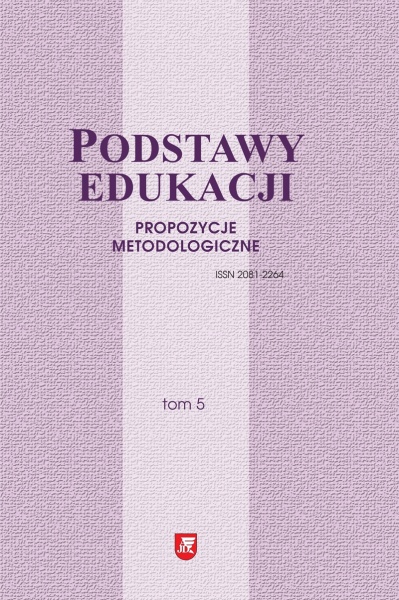Abstrakt
Autorka ukazuje proces kształcenia traktowany jako przedmiot badań dydaktyki oraz obszar praktyk dydaktycznych. Przywołuje dwie zasadniczo odmienne orientacje teoretyczno-metodologiczne obecne w badaniach dydaktycznych: pozytywizm i interpretatywizm, które mają konsekwencje dla charakteru tworzonych projektów kształcenia. Przedstawia główne różnice między pozytywistycznym i interpretatywnym podejściem do badań nad kształceniem oraz implikacje tych stanowisk dla programu kształcenia, przebiegu lekcji, relacji między uczniem i nauczycielem, celów nauczania i sposobów ich realizacji.
Bibliografia
Ashman, A.F., Conway, R.N.F. (1993). Teaching Students to Use Process-based Learning and Problem Solving Strategies in Mainstream Classes. Learning and Instruction, 3.
Ashman, A.F., Conway, R.N.F. (1993). Using Cognitive Strategies in the Classroom. London.
Bain, W.J., Kiziltan, M.U. (1991). Toward a Postmodern Politics: Knowledge and Teachers. Educational Foundations, Winter.
Bauman, Z. (2003). Ponowoczesny świat i jego wyzwania. Rozmowa z profesorem Zygmuntem Baumanem. Res Humana, 2.
Becher, T., McLure, S. (1978). The Politics of Curriculum Change. London.
Bruner, J.S. (1963). On Knowing: Essays for the Left Hand. Cambridge.
Cylkowska-Nowak, M. (red.) (2000). Edukacja. Społeczne konstruowanie idei i rzeczywistości. Poznań.
Cybal-Michalska, A. (red.) (2011). Tożsamość w kontekście edukacyjnym i społeczno-kulturowym. Między partykularyzmem a uniwersalizmem. Poznań.
Dilthey, W. (1927). Gesammelte Schriften. T. 7: Der Aufbau der geschichtlichen Welt in den Geisteswissenschaften. B. Groethuysen (red.). Leipzig – Berlin.
Doll, W.E. (1989). Foundations for a Post-Modern Curriculum. Journal of Curriculum Studies, 21, 3.
Gallagher, J.J. (1994). Teaching and Learning. New Models. Annual Review of Psychology, 45.
Giddens, A. (2002). Nowoczesność i tożsamość. „Ja” i społeczeństwo w epoce późnej nowoczesności. A. Szulżycka (tłum.). Warszawa.
Giroux, H. (1991). Modernism, Postmodernism, and Feminism: Rethinking the Boundaries of Educational Discourse. W: H. Giroux (red.). Postmodernism, Feminism, and Cultural Politics. Albany.
Glaser, R. (1987). Advances in Instructional Psychology. New York.
Klus-Stańska, D. (2010). Dydaktyka wobec chaosu pojęć i zdarzeń. Warszawa.
Kwaśnica, R. (2007). Dwie racjonalności. Od filozofii sensu ku pedagogice ogólnej. Wrocław.
Leitch, V. (1986). Deconstruction and Pedagogy. W: C. Nelson (red.). Theory in the Classroom. Chicago.
Lyotard, J.F. (1997). Kondycja ponowoczesna. Raport o stanie wiedzy. M. Kowalska, J. Migasiński (tłum.). Warszawa.
Melosik, Z. (1993). Postmodernizm i edukacja. Kwartalnik Pedagogiczny, 1.
Melosik, Z. (1995). Współczesne amerykańskie spory edukacyjne. Poznań.
Ornstein, A.C., Hunkins, F.P. (1998). Program szkolny. Założenia, zasady, problematyka. K. Kruszewski (tłum.). Warszawa.
Siegler, R.S. (1990). How Content Knowledge, Strategies and Individual Differences Interact to Produce Strategy Choices. W: W. Schreider, F.E. Weinert (red.). Interactions among Aptitudes, Strategies and Knowledge in Cognitive Performance. New York.
Szkudlarek, T. (1993a). Pedagogie amerykańskiego postmodernizmu: edukacja wobec kulturowego przełomu. W: Z. Kwieciński, L. Witkowski (red.). Spory o edukację. Dylematy i kontrowersje we współczesnych pedagogiach. Warszawa.
Szkudlarek, T. (1993b). Wiedza i wolność w pedagogice amerykańskiego postmodernizmu. Kraków.
Śliwerski, B. (2010). O (nie-)wymierności pracy nauczyciela. W: R. Kwiecińska, M.J. Szymański (red.). Nauczyciel wobec zróżnicowań społecznych. Kraków.
Śliwerski, B. (2011a). Czy oświata potrzebuje przewrotu kopernikańskiego? W: J. Szomburg (red.). Rozwój i edukacja. Wielkie przewartościowanie. Gdańsk.
Śliwerski, B. (2011b). Odnajdywanie tożsamości pedagogiki w ponowoczesnym świecie i nauce. W: A. Cybal-Michalska (red.). Tożsamość w kontekście edukacyjnym i społeczno-kulturowym. Między partykularyzmem a uniwersalizmem. Poznań.
Taylor, Ch. (2001). Źródła podmiotowości. Narodziny tożsamości nowoczesnej. M. Gruszczyński i in. (tłum.). Warszawa.
Thompson, E. (2008). Postmodernizm, pamięć, logocentryzm. W: H. Gosk, B. Karwowska (red.). (Nie)obecność. Pominięcia i przemilczenia w narracjach XX wieku. Warszawa.
Ulmer, G. (1989). Teletheory: Grammatology in the Age of Video. New York – London.
Wawrzyniak, J. (2005). Aksjologiczność i etyczność nauk społecznych. W: K. Zamiara (red.). Etyczne aspekty badań społecznych. Poznań.
Wexler, P. (1987). Social Analysis of Education. After the New Sociology. London.
OŚWIADCZENIE AUTORA:
Mam świadomość, że czasopismo jest wydawane na licencji Creative Commons - Uznanie autorstwa (https://creativecommons.org/licenses/by/4.0/legalcode).
Przesyłając artykuł wyrażam zgodę na jego udostępnienie na tej licencji.
